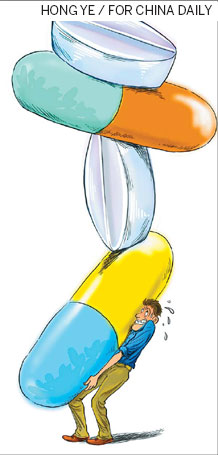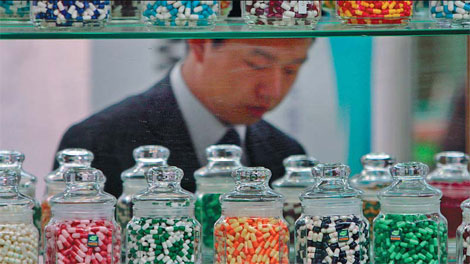Bitter medicine for sick people
Updated: 2011-12-19 09:29
By Liu Jie (China Daily)
|
|||||||||||
|
Capsules on display at a pharmaceutical exhibition in Nanjing, Jiangsu province. The government's control of the price-setting system is a major cause of the high cost of drugs, some experts say. [Photo/China Daily] |
The cost of medication is expected to continue on an upward path
BEIJING - His working hours are different from those of most people. He starts before 8:00 am, saying hello to his clients. He spends the rest of the morning catching up on other items, and then has a working lunch or chats with his clients at noon. In the afternoon, he either attends professional conferences and meetings or rests. Then in the evenings, he attends business dinners with clients, maybe followed by drinks and some karaoke.
Feng Bin, 28, is always in close contact with his clients - hospital doctors. He is a medicine representative for a multinational pharmaceutical company. He graduated from a national-level medical university in Beijing three years ago and has a master's degree. He's not complaining about his remuneration package either - his basic monthly salary is 3,000 yuan ($472), plus a performance-linked monthly bonus of between 3,000 and 6,000 yuan and a yearly bonus which can be as much as tens of thousands of yuan, plus subsidies for transport and telecommunications.
However, he says he doesn't feel good that doctors receive money for prescribing the medications he promotes, or at witnessing patients paying over the odds for a drug selling at several times more than its manufacturer's price.
Liu Yuan, Feng's former classmate, has been working at a major State-owned hospital in Beijing for three years. She told China Daily that she has received money from Feng: After all, he promotes treatments for high blood pressure and Liu works in a cardiovascular unit.
"Our doctors do have many choices when prescribing medicines, from domestically produced drugs to products by foreign companies," said Liu. "His (Feng's) company is a big international drugmaker, the brand is reliable, our patients like products from foreign companies and he is an old friend. Although all drugmakers offer rebates (commission to doctors who prescribe the company's products), I, of course, choose what Feng recommended. Why not?"
However, when asked if she would swap brands if another company offered a larger rebate than Feng's, she did not answer.
Liu's monthly salary is between 4,000 and 5,000 yuan when basic and performance-related payments are added together. "It (receiving rebates for pharmaceutical sales) is very common in hospitals. I have not accurately calculated how much I can earn every month. But I don't think it's more than my salary," Liu said.
Jiang Bingkun, 58, is Liu's patient. He has been suffering from high blood pressure for more than 10 years and has to take medication on a daily basis. Over the past few years, his monthly expenditure on drugs has increased to more than 300 yuan, from around 40 yuan in 2001, the Beijinger said.
"I noticed that the government set up lists of basic drugs and forced reductions in the prices of some medications for chronic diseases, which is really good. However, I have found that some cheap and effective medicines are not available at the hospital anymore. So, in general, my expenditure on medication hasn't fallen at all," he said, adding that doctors sometimes recommend new treatments to him, saying the new products are more effective and have fewer side-effects.
"I am really confused. It's difficult to make a decision, because, at my age, my health is the top priority, more important than money. On the other hand, I don't know that the drugs they recommended - usually the higher-priced ones - are really as good as they said or whether the doctors have received money to promote the new products," Jiang said.
The prices of medicines in hospitals are much higher than in the factories, sometimes as much as 10 times higher, according to investigations by some Chinese media. The case of Clindamycin phosphate, a treatment for chronic bronchitis, provides an effective example: The manufacturer's price is 0.6 yuan, but the injection is sold to the pharmaceutical representatives by distributors for 4 yuan. The price of the drug on Beijing's essential drug list (EDL) is 11 yuan, but it is sold to patients at top hospitals for 12.65 yuan.
Many people have claimed that the pharmaceutical companies, medicine representatives, hospitals and doctors are driving up the prices and earning fat profits.
On Dec 1, the National Development and Reform Commission (NDRC), which is authorized to set prices, launched a nationwide investigation into the pricing of medicines.
Pharmaceutical companies are also obliged to report their production conditions, and the retail and hospital prices of their Chinese-made products to the NDRC or provincial-level pricing departments.
Xu Deren, a medical industry researcher for the Hong Kong-based consultancy KGI Securities, said the NDRC is making an effort to discover the real cost of medicines, thus paving the way for price reductions. "The ceiling prices set by the commission or local departments are expected to further decrease, resulting in a general reduction in prices," he said.
Price setting

To set the price of medicines, China uses a ceiling-price system, combined with bidding for reimbursement levels or to gain entry to the list of essential drugs.
When a medication is due to go on the market, the drugmaker should calculate the costs, usually in two parts - the production costs, also known as the manufacturer's price, and the commercialization costs. The first part involves funds invested in research and development - if it's an innovative new product, raw materials, human resources, equipment, and the consumption of water and electricity. Meanwhile, the second part of the equation includes management and fiscal expenditure, distribution costs and expenditure on marketing, sales and advertising.
The drugmaker should also hand over related files to the NDRC or local pricing department. The authorities will then establish a "ceiling" or the highest price for the medicine, based on the various costs and the real market conditions.
The NDRC formulated China's national reimbursement drug list (NRDL), covering basic medicines. Meanwhile, the medicine bidding and purchasing departments of various municipalities, provinces and autonomous regions additionally map out their own EDLs in line with local conditions.
After the medicine is given a ceiling price, it may be included in NRDL or EDL bidding, at the price determined by the drugmaker and not higher than the ceiling price. If accepted, the hospital price for the drug will be the bidding price plus a commission of 15 percent, which is paid to the hospital.
"So, if we say hospital prices are vastly higher than those charged by the manufacturer, where does this disparity come from? You can clearly see that's from the second part (of the equation), this part can be really flexible," said Zhuang Yiqiang, deputy general-secretary of the Chinese Hospital Association, adding that those costs feed distribution companies, medicine sales, advertising agencies as well as some doctors.
Knowing the price-setting procedure, the public may be suspicious as to why the NDRC and the local pricing departments set such high ceiling prices and why bidding prices are allowed to rise so high.
Gu Xin, a professor at the School of Government at Peking University, said government pricing control is the key cause of high medicine prices, adding that this sort of pricing system often results in bribery and corruption at different levels, ranging from governmental institutions to grassroots hospitals. "We should adopt a market-oriented pricing reform and set up a strict supervisory framework for the pharmaceutical industry to solve the problem," he said.
Related Stories
Medical ignorance a problem 2010-12-03 07:58
Authorities tighten control of medication 2007-10-09 07:37
Medical reform calls for combined efforts 2005-08-01 09:12
- Property prices in big cities declining
- Trade frictions to challenge economic diplomacy
- Bitter medicine for sick people
- Club Med opens 2nd resort in China
- Liquor exchange platform opens
- Long-term mechanism for real economy urged
- Growth moderation not 'bad thing' for China
- China upgrades 1st UHV transmission system









